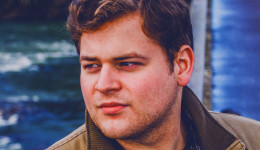Aidan R



Instruments: Saxophone, Music
Styles: Classical, Jazz, Pop, Rock, Blues, Folk, Country, R&B, Gospel, Musical Theater, Opera, Latin, Funk, Hip Hop, Electronic, Salsa, Showtunes, Reggae, Latin Jazz, Swing, New Age, Samba, Bossa Nova, Soul, Marching Band, Punk, Avant-garde


Aidan R


Instruments: Saxophone, Music
Styles:
Classical, Jazz, Pop, Rock, Blues, Folk, Country, R&B, Gospel, Musical Theater, Opera, Latin, Funk, Hip Hop, Electronic, Salsa, Showtunes, Reggae, Latin Jazz, Swing, New Age, Samba, Bossa Nova, Soul, Marching Band, Punk, Avant-garde
Where I Teach:
Ages Taught: 10-80
Master Degree: Boston University
Bachelor Degree: University of Oregon
2012 - University of Oregon Pathway Scholarship
2014 - Composer at Oregon Bach Festival Composers Symposium
2016 - Composer at Oregon Bach Festival Composers Symposium
2019 - Participant, ALEA III Young Composer's Initiative
I'm a composer and saxophonist who's passionate about education! I believe eclecticism and variety are great virtues of music education, and I have experience teaching not only a wide variety of styles of saxophone playing, but also, music theory, composition, arranging, music production, and music engraving! Any style and any skill level are welcome!
I've played the saxophone for almost 16 years, and every day, I find new reasons to love the instrument. I would love to share and foster that passion with others. In addition, I would love to foster passion in composing, arranging, and producing music.
I've taught private lessons for around four years, since I was a junior in college. I now also teach music theory and composition at The Community Music Center of Boston. I believe that, as great as regular, focused practice is, it is also my job as a private tutor to shape each and every lesson around an individual student's specific needs. I've seen a lot of teachers use a cookie-cutter, one-size-fits-all pedagogical approach, and I don't think that's productive for my students or myself! After all, if you want to learn to play the saxophone like David Sanborn, writing four-part fugues isn't a very efficient method of getting you where you want to go, and if you want to write an opera, spending weeks doing jazz transcriptions isn't going to be helpful. Every student deserves the best tools to follow their dreams!
One of the single most important thing a student can do is to listen. Method books and etudes are great, but it's important for students of all ages to have a frame of reference for what they want to achieve. Once we both know what a student wants to achieve, I'll gather a series of repertoire for them. For beginners, I start with just the mouthpiece, so they understand how to have and maintain a good embouchure before they start with the rest of the saxophone. From then on, we can start on method books--I generally use either Essential Elements or Standard of Excellence--and some extra short pieces I compose for them based on their needs. I also spend time working on ear training and overtone control as soon a I think a student is ready. The sooner they learn these elements, the easier it will be for them to learn more.
For more advanced students, I like basing lessons around repertoire, but that repertoire can vary a great deal based on their needs.
Learning an instrument is no easy task, and it can be daunting, especially in front of another person with more experience than you. Anywhere my lessons take place is a "shame free zone" where students should never be afraid to make mistakes and learn at their own pace. I like to keep things positive: progress is great and exciting, and I firmly believe that students progress faster and more consistently when they're happy and proud of what they've accomplished. I don't like building lessons around competitions or juries--if a student wants to compete in something, I'm happy to help them be the best musician they can be, but no teacher should use the ominous specter of a recital to push a student forward. The most important thing for me is that my students are proud of the progress they've made.

